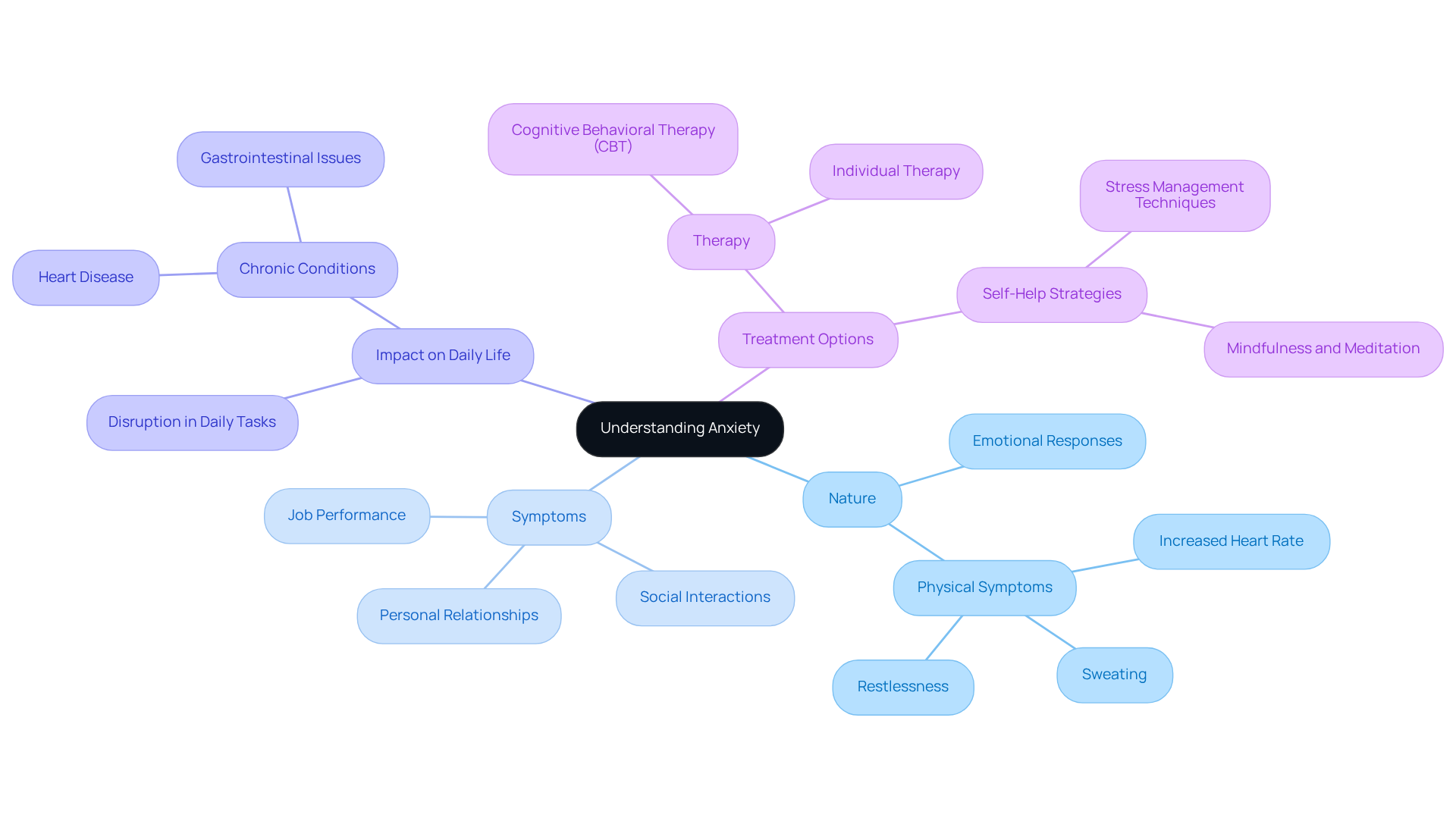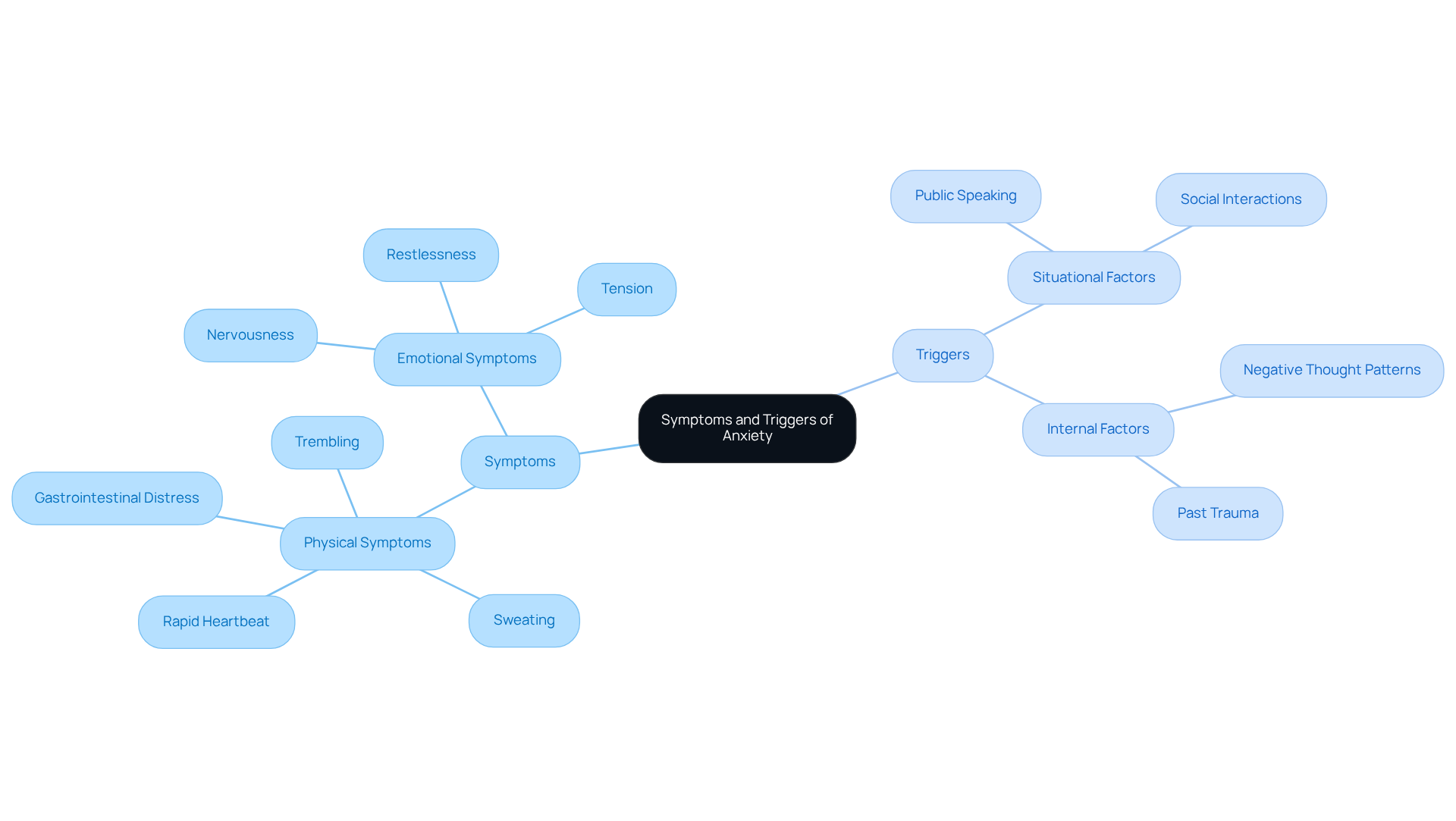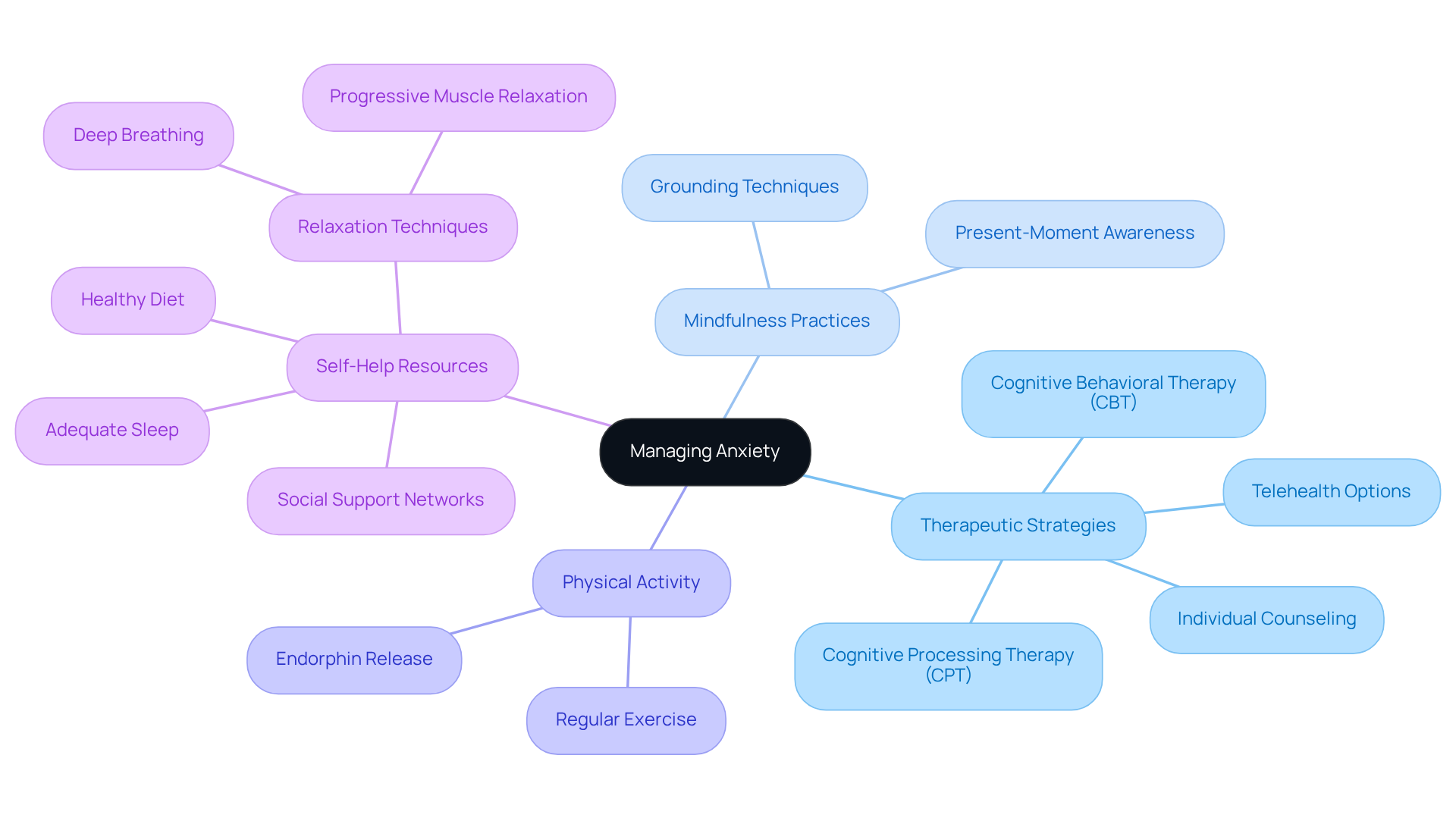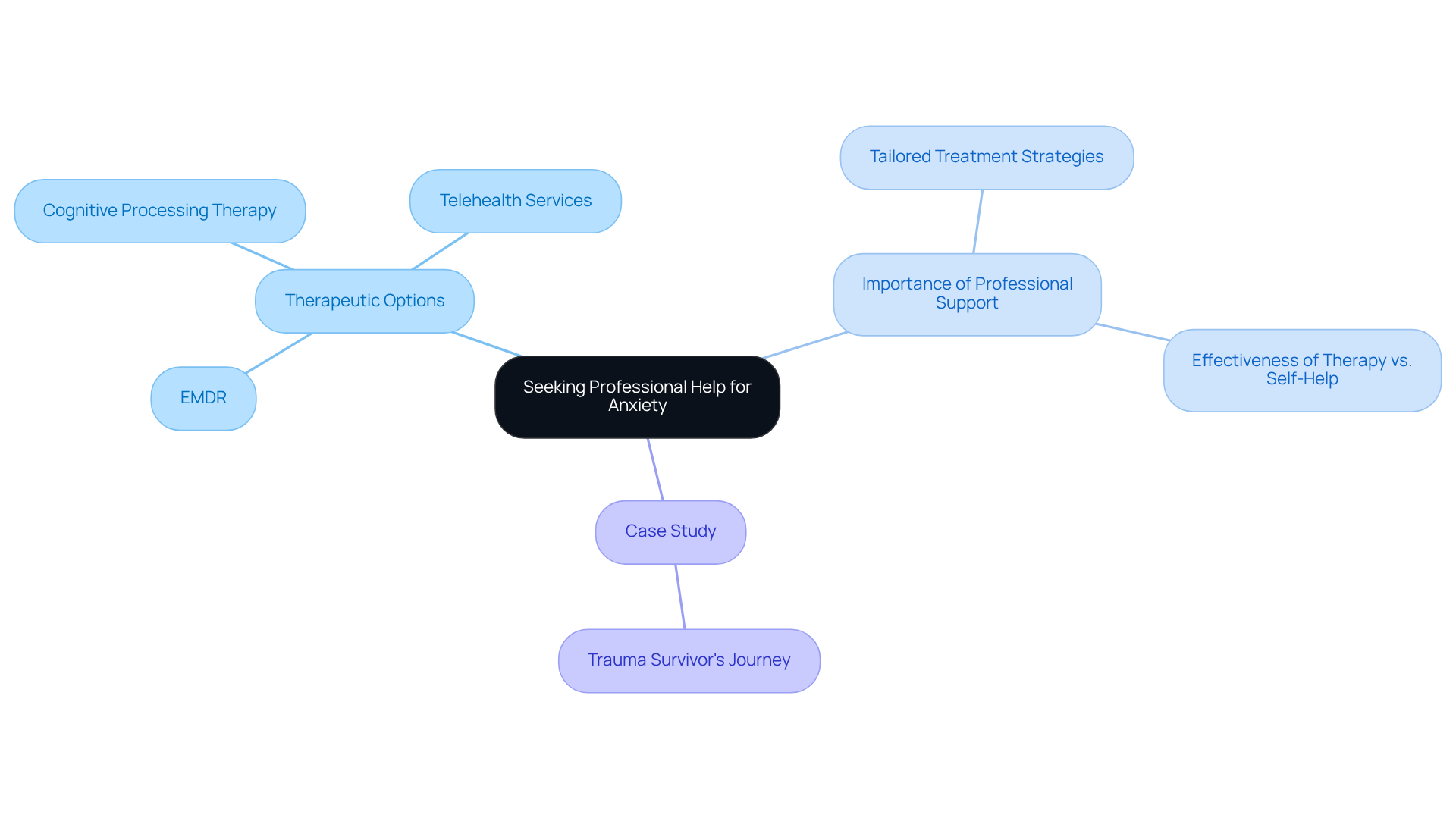Overview
This article thoughtfully explores what to do when faced with anxiety, shedding light on its symptoms, triggers, and effective management strategies.
Have you ever felt overwhelmed by your emotions? Recognizing how anxiety impacts daily life is crucial for healing.
It advocates for personalized therapeutic approaches, such as cognitive-behavioral therapy and mindfulness techniques, which serve as essential tools for individuals seeking to navigate their anxiety effectively.
As we delve deeper into these strategies, remember that you are not alone on this journey. Seeking help is a courageous step towards a more peaceful existence.
Introduction
Anxiety affects millions, manifesting as a complex interplay of emotional and physical responses that can disrupt daily life.
Have you ever felt overwhelmed by these sensations? Understanding what to do when anxiety strikes is crucial for individuals seeking relief and clarity.
As we explore this further, consider how you can navigate the overwhelming sensations of fear and unease.
What strategies can effectively transform these experiences into manageable challenges? Together, we can find a path toward healing and support.
Define Anxiety: Understanding Its Nature and Impact
Anxiety is a complex emotional response, encompassing feelings of unease, apprehension, and fear. Have you ever felt overwhelmed by these emotions? It often arises as a reaction to stress or perceived threats, leading to various physical symptoms such as increased heart rate, sweating, and restlessness. Unlike a fleeting sensation, distress can develop into a long-lasting state, referred to as , which significantly impacts daily functioning. The American Psychological Association defines this emotion as one marked by tension, concerned thoughts, and physiological changes, including elevated blood pressure. This definition underscores the intricate connection between psychological and physical reactions in stress-related disorders.
At The Emerald Couch, we understand that the journey to managing stress is unique for each individual. Therapy duration varies, with many clients beginning to feel better or see improvements within 4 to 6 weeks. Our customized treatment plans are thoughtfully created to address your specific needs, ensuring that you receive the essential support for trauma and stress recovery. Additionally, we offer virtual appointments for those who may need them, providing flexibility in accessing therapy. For high achievers, who often find it challenging to prioritize their own needs, our approach assists you in slowing down, being more present, and managing feelings of overwhelm, stress, and burnout.
The impact of stress on physical health is profound; it can lead to chronic conditions such as heart disease and gastrointestinal issues. Did you know that anxiety-related conditions affect around 40 million adults in the U.S.? This makes them the most common mental health issues. Moreover, stress can significantly hinder everyday tasks, with research indicating that 22.8% of people with anxiety-related disorders experience considerable disruption in their lives. Practical examples illustrate this: individuals may struggle with job performance, social interactions, and personal relationships due to excessive stress. Understanding what to do when you feel anxiety is vital for individuals to acknowledge their experiences and seek appropriate assistance. Importantly, mood disorders are treatable, and understanding what to do when you feel anxiety can lead to meaningful improvement in managing symptoms with The Emerald Couch.

Identify Symptoms and Triggers of Anxiety
Signs of unease can manifest in various ways, often including feelings of nervousness, restlessness, or tension. You might notice physical symptoms such as a rapid heartbeat, sweating, trembling, or gastrointestinal distress. Stress can arise from situational factors—like public speaking or social interactions—as well as internal ones, which may stem from negative thought patterns or past trauma. For example, individuals who have experienced trauma may find that certain cues trigger intense feelings of distress. Recognizing these symptoms and triggers is vital for knowing what to do when you feel anxiety.
At The Emerald Couch, we deeply value the importance of fostering a trusting therapeutic relationship, a cornerstone of effective therapy. Did you know that on average, individuals see three therapists before finding the right fit? Our personalized approach ensures that you connect with a therapist who truly understands your unique experiences and can guide you on your journey. We recognize that engaging in therapy is a significant investment in your mental health, and we are committed to creating a safe, judgment-free space where you can express your concerns freely.
Moreover, integrating mindfulness techniques into therapy can profoundly enhance your experience and offer insights into what to do when you feel anxiety. Mindfulness practices, such as breath awareness and body scans, empower you to observe your thoughts and feelings without becoming overwhelmed. This shift in perspective can be particularly beneficial for trauma survivors, as it fosters a sense of distance between you and your distress, enabling a more effective response to triggers. Resources like the Mayo Clinic and the National Institute of Mental Health provide comprehensive lists of symptoms and common triggers, helping individuals gain a clearer understanding of their experiences.
As we explore these concepts further, consider how these insights resonate with your own journey. Have you ever felt overwhelmed by your past? Remember, you are not alone, and support is available to guide you through .

Explore Effective Strategies and Resources for Managing Anxiety
Effectively managing anxiety often requires understanding what to do when you feel anxiety through a multifaceted approach. At The Emerald Couch, we understand that each person’s journey is unique, which is why we specialize in designed to address trauma and anxiety disorders. Have you ever felt overwhelmed by your past? Strategies like cognitive-behavioral therapy (CBT) and Cognitive Processing Therapy (CPT) can assist you in identifying and challenging negative thought patterns while processing those traumatic experiences. Mindfulness practices that promote present-moment awareness are also integral to our approach, helping you to feel grounded and connected.
Our services encompass individual counseling and telehealth options, ensuring that you receive the support that best fits your needs. Regular physical activity can significantly lower stress levels by releasing endorphins and enhancing overall mood. In addition to this, relaxation methods such as deep breathing and progressive muscle relaxation are effective strategies for what to do when you feel anxiety, as they can help reduce the physical symptoms of stress. For those who identify as overachievers and struggle to prioritize their needs, we offer guidance to help you slow down, become more present, and navigate feelings of overwhelm and burnout.
Resources such as the Anxiety and Depression Association of America and the National Health Service provide valuable tips and self-help strategies. These include:
- Maintaining a healthy diet
- Ensuring adequate sleep
- Engaging in social support networks
By examining these strategies and employing the customized care choices offered at The Couch, you can create a thorough toolkit for what to do when you feel anxiety effectively. Remember, you are not alone on this journey, and we are here to support you every step of the way.

The Importance of Seeking Professional Help
While self-help techniques can offer some comfort, understanding what to do when you feel anxiety is essential for individuals grappling with ongoing distress, alongside professional support. At The Emerald Couch, our mental health experts create tailored treatment strategies that address each person's unique needs, particularly focusing on trauma and stress-related conditions. This holistic approach is especially beneficial for clients seeking to understand and heal from their past experiences.
Therapeutic options for what to do when you feel anxiety may include psychotherapy methods such as EMDR and Cognitive Processing Therapy (CPT), telehealth services, or a combination of both, all tailored to the severity of the anxiety disorder. Have you ever felt overwhelmed by your past? Interacting with a professional not only opens the door to evidence-based treatments but also helps individuals learn what to do when you feel anxiety, cultivating a supportive environment where they can explore their emotions and develop effective coping strategies under expert guidance.
At The Emerald Couch, we prioritize building trust and comfort in therapy, ensuring that clients feel safe as they navigate their pain. Data shows that therapy significantly exceeds the effectiveness of self-help techniques; only about 37% of individuals with anxiety-related disorders receive treatment, highlighting the urgent need for increased awareness and accessibility of .
A case study from The Emerald Couch illustrates what to do when you feel anxiety, demonstrating how tailored therapeutic interventions have empowered clients, including a trauma survivor who learned to manage anxiety and reclaim control over their life through personalized therapy. As we explore this further, consider how seeking help could be the first step in your journey toward healing.

Conclusion
Anxiety is a multifaceted emotional response that can significantly affect daily life, often manifesting as feelings of unease, fear, and physical symptoms. Understanding the nature of anxiety, recognizing its symptoms and triggers, and knowing effective strategies for management are crucial steps in addressing this common mental health issue. By exploring tailored therapeutic approaches and resources, individuals can find the support needed to navigate their experiences with anxiety.
Have you ever felt overwhelmed by your anxiety? Key insights from our discussion highlight the importance of identifying personal triggers and symptoms, as well as the value of professional help. Techniques such as:
- Cognitive-behavioral therapy
- Mindfulness practices
- Lifestyle adjustments
can empower you to manage your anxiety effectively. Furthermore, fostering a trusting therapeutic relationship can enhance the healing process, providing a safe space for exploration and growth.
Ultimately, seeking assistance is a vital step toward reclaiming control over your life in the face of anxiety. With the right support and strategies, you can learn to cope with your feelings, reduce the impact of anxiety on your daily life, and embark on a path to recovery. Remember, reaching out for help is not a sign of weakness; it is a courageous step toward a healthier, more fulfilling life.
Frequently Asked Questions
What is anxiety and how does it manifest?
Anxiety is a complex emotional response characterized by feelings of unease, apprehension, and fear. It often arises as a reaction to stress or perceived threats, leading to physical symptoms such as increased heart rate, sweating, and restlessness.
How does anxiety differ from temporary feelings of unease?
Unlike fleeting sensations, anxiety can develop into a long-lasting state that qualifies as a mental health condition, significantly impacting daily functioning.
What does the American Psychological Association say about anxiety?
The American Psychological Association defines anxiety as an emotion marked by tension, concerned thoughts, and physiological changes, including elevated blood pressure, highlighting the connection between psychological and physical reactions in stress-related disorders.
How long does therapy typically take to show improvements for anxiety?
Many clients begin to feel better or see improvements within 4 to 6 weeks of starting therapy.
What type of treatment plans does The Emerald Couch offer for anxiety?
The Emerald Couch provides customized treatment plans that address individual needs, ensuring essential support for trauma and stress recovery.
Are virtual appointments available for therapy?
Yes, The Emerald Couch offers virtual appointments for those who may need flexibility in accessing therapy.
How does stress impact physical health?
Stress can lead to chronic conditions such as heart disease and gastrointestinal issues.
How prevalent are anxiety-related conditions in the U.S.?
Anxiety-related conditions affect around 40 million adults in the U.S., making them the most common mental health issues.
What percentage of people with anxiety-related disorders experience significant disruptions in their lives?
Research indicates that 22.8% of individuals with anxiety-related disorders experience considerable disruption in their everyday tasks.
How can individuals manage their anxiety effectively?
Understanding what to do when experiencing anxiety is crucial, and seeking appropriate assistance can lead to meaningful improvement in managing symptoms, as highlighted by The Emerald Couch.




